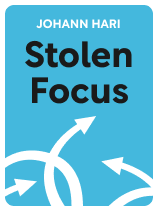

This article is an excerpt from the Shortform book guide to "Stolen Focus" by Johann Hari. Shortform has the world's best summaries and analyses of books you should be reading.
Like this article? Sign up for a free trial here .
What is “flow?” Why is it so hard to find your flow these days?
Flow is our highest form of sustained attention. Johann Hari, the author of Stolen Focus, argues that the distractions of modern life are destroying it.
Find out what makes finding your flow so difficult these days.
Behaviorism vs. Positive Psychology
Hari believes the reason you have trouble finding your flow has roots in the psychological theory of behaviorism. In the 1930s, psychologist B.F. Skinner discovered that you can train animals to do almost anything by rewarding them. According to Hari, Skinner extended that insight to humans, arguing that we don’t have real freedom of choice. We pay attention to what the environment trains us to pay attention to, and we perform tasks because we crave a reward at the end, not because we want to do them.
Hari argues that Skinner’s theory is the basis of attention-grabbing mechanisms that are ubiquitous in modern life, such as “like” buttons on social media. Every time users post on social media, they’re pursuing the reward of external validation in the form of likes and learning to keep doing it.
In the 1970s, psychologist Mihaly Csikszentmihalyi rejected the view that we’re solely reward-driven. He focused on positive aspects of the mind and how to nurture them (positive psychology). He studied artists, athletes, and others with strong interests to understand their motivations. According to Hari, the conflict between behaviorism and positive psychology is at the core of modern life. Behaviorist mechanisms rule our lives, but if we fight them we can tap into the creative aspects of our minds.
The State of Flow
Through his research, Csikszentmihalyi identified “flow,” a state of complete focus. When you’re in flow, you become engrossed in an activity, lose track of time, and lose yourself in the process, not pursuing any rewards at the end. He identified several features of flow, and Hari highlights three that are core to the experience:
- To get into flow, you need to devote yourself to only one task.
- The task must be intrinsically motivating.
- The task must be just right—not too easy and not too hard. If it’s too easy, your brain won’t devote all its power to the task. If it’s too hard, you’ll become discouraged which will prevent you from reaching flow.
Behaviorism Cannot Foster Creativity
The key difference between behaviorism and flow is the type of motivation that triggers them. Behaviorism is triggered by extrinsic motivation, such as rewards or punishments, while flow is triggered by intrinsic motivation, an internal drive to do or accomplish something.
While both intrinsic and extrinsic motivation can get you to complete a task, only intrinsic motivation will get you to tap into your creativity. A study found that college students became less engaged with their projects if they involved financial incentives. The researchers concluded that there are three universal needs that foster intrinsic motivation: competence, autonomy, and psychological relatedness (a desire to feel connected to others).
Behaviorist mechanisms can help individuals achieve competence—this is at the heart of most educational technology—and even get a sense of connection with others through social elements, like social media. But by nudging individuals to do or avoid doing something through rewards and punishments, they sap their autonomy and quash intrinsic motivation.
Finding Flow Today Is Harder Than It Should Be
Although flow is the highest form of focus we can achieve, it’s easily disrupted. Hari argues that the distractions of modern life and our daily routines keep us from reaching flow.
We spend our days fighting off distractions to focus on goals that don’t motivate us, and we decompress by giving in to our preferred distractions. At no point in our day do we purposely engage with a task that will help us reach flow.
Five Ways Society Disrupts Your Flow
There are many ways society makes it hard for you to find flow, besides keeping you distracted. In Flow, Csikszentmihalyi identifies five ways cultures get in the way:
- The government or culture makes it difficult to survive, so people don’t have time or energy to develop their skills and interests.
- The culture or government creates too much structure in everyday life, so there isn’t time or opportunity for people to seek out meaningful, enjoyable activities.
- Societies develop cultural customs that keep people from looking beyond tradition.
- People are forced to do things that don’t align with their goals, such as working meaningless jobs, which creates alienation and boredom.
- In times of social or economic change, people experience a loss of order or meaning in everyday life, which makes them anxious and distracted from meaningful activities.

———End of Preview———
Like what you just read? Read the rest of the world's best book summary and analysis of Johann Hari's "Stolen Focus" at Shortform .
Here's what you'll find in our full Stolen Focus summary :
- The seven factors causing the current attention crisis
- Johann Hari's three-part solution to gaining your attention back
- Why society needs to change, not just individuals






